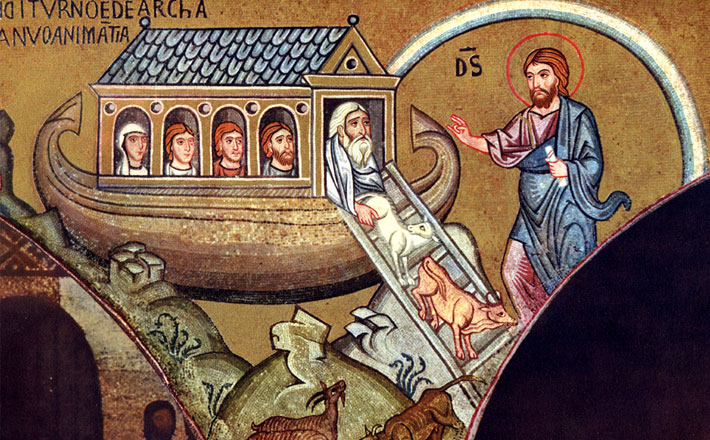Commentary on Proverbs 8:1-8, 19-21; 9:4b-6
The portion of Proverbs before us constitutes the sixth of twelve readings for the Vigil of Easter where, in some liturgies, it is accompanied with the descriptor, “The wisdom of God.” The response is Psalm 19.
Not every Easter Vigil, however, includes Proverbs. On the one hand, the Presbyterian Church, U.S.A., does include the reading.1 The Episcopal liturgy, on the other hand, inserts Isaiah 4:2-6 as a forth reading and eliminates Proverbs altogether.2 The Roman Catholic Easter Vigil substitutes Baruch 3:9-15, 32-4:4, another passage treating the presence of Wisdom in the world.3
Nor is the reading’s place in the liturgy of the Evangelical Lutheran Church in America particularly secure. The rubrics indicate that, of the twelve readings appropriate for the Vigil, “The four readings marked by an asterisk are not omitted.” Proverbs 8 and 9 are not asterisked and, moreover, the Baruch reading described above is offered as a substitution.4
The working preacher might, therefore, be tempted to search for a text that is easier to mine at the end of a busy — perhaps frantic — Holy Week. This is especially the case considering the following difficulties:
- The assigned reading is awkwardly divided. There is, of course, the obvious problem of simply skipping from Proverbs 8:8 to verses 19 to 21, and then again to 9:4b. One might rightly presume that such a digested reading loses important declarations about God’s wisdom including, a.) the benefits of acquiring wisdom (especially verses 11-21) and, b.) the role of God’s wisdom in the creation (verses 22-31). Beyond that, however, the lection breaks up the poetry. Proverbs 8:1-3 describes the public availability of wisdom who “calls” and “raises her voice.” The whole of verses 4 to 11 comprise the direct speech of that summons. Wisdom urges the invited to hear and learn since what she offers is both righteous and of inestimably more value that silver, gold, or jewels (verses 10-11). Likewise, verses 1 to 4a are a part of a larger poem (9:1-6, 13-18).5
- There is the perineal scholarly dispute about the identity and nature of this feminine figure who summons people to her house and meal from which they might obtain both insight and life. Who or what is this Lady Wisdom? Richard J. Clifford helpfully articulates four headings by which Lady Wisdom has been understood: 1) Wisdom as a hypostasis of Yahweh; 2) Wisdom as a Syro-Palestinian or Egyptian goddess; 3) Wisdom as the Mesopotamian divine or semi divine ummanu; 4) Wisdom as a pure literary fiction. Clifford favors the third view.6 The late Roland E. Murphy, on the other hand, remarked, “Is Wisdom not the LORD, who turns towards creatures and summons them through creation, through the wisdom experience?”7
It seems unlikely that any of these problems will be worked out in a fifteen-minute sermon in the Easter Vigil — nor should they be! Why then preach on Proverbs 8 and 9 on that hopeful eve? And what might one say?
They “why?” question is answered by the placement of the text in the context of the other readings assigned to the Easter Vigil. The texts lead the worshipping congregation from the creation through the great stories of God’s redemption and deliverance of God’s people and, thus, of the world. The summons of God through Woman Wisdom is a part of that larger story of God’s redemption of all things.
Whatever the ancient origins of Woman Wisdom may have been, the observation that the invitation of Woman Wisdom is enveloped in the person and the summons of the LORD can hardly be gainsaid. Beyond the description of Wisdom’s participation in the creation (Proverbs 8:22-30), Woman Wisdom—like none other than the LORD– offers life (Proverbs 9:4; see 8:35; 9:11). To respond to the invitation of this summons leads to participation in all that is noble, right, and righteous (Proverbs 8:6, 8). It is a call to life.
The “how” to preach this text — or at least one approach — might be at this very juncture. The gospel story is the story of God’s ultimate redemption of the cosmos, a story that begins shortly after creation and which reaches a climax in the story of Jesus’ resurrection. But that summons to life has been present all along. For the Jews, Woman Wisdom, present at the creation, came to reside in the Torah (Sirach 24:1-23; Baruch 4:1).
For the rest of us, Paul declares that God’s eternal power and divine nature, invisible though they be, are clear enough in the creation — even if Gentiles missed the obvious!8 Similarly, and in an echo of Proverbs 8:22ff., John reminds us “All things came into being through him, and without him not one thing came into being. What has come into being in him was life, and the life was the light of all people” (John. 1:3-4). And yet, the world neither received him or knew him (John 1:10-11).
God’s way with the world is, it appears, completely consistent. While the summons of Woman Wisdom is embedded in a book full of specific (if often enigmatic!) aphorisms, she herself does not offer specific information. She simply calls human beings, inviting them to eat her bread and drink of her wine and thus to live.
So too with Jesus. Rudolf Bultmann long ago noted of John 17:6 (“I have made your name known to those whom you gave me from the world”):
“ … still he has imparted no information about God at all, any more than he has brought instruction about the origin of the world or the fate of the self. He does not communicate anything but calls men to himself.’ Or when he promises a gift, he is, himself, that gift; he himself is the bread of life that he bestows (6:35); he himself is the light (8:12); he himself is life (11:25; 14:6).”9
Like Woman Wisdom, Jesus calls human beings to himself. Like Wisdom, Jesus Christ comes from the LORD; one may find him and his life only when the LORD offers him. But there is good news that transcends Proverbs in the dark night of an Easter Vigil — or in any other darkness into which we may stumble. God has not only offered his Son, but that living, resurrected Jesus Christ seeks us out. We cannot find him in our darkness or with eyes blurred by tears. Mary knew the pain of that. In the assigned Gospel reading we hear her cry, “They have taken away my Lord, and I do not know where they have laid him” (John 20:13).
Then Jesus called her by name. And then, Mary came alive.
With the resurrection of Jesus, we hear no general summons to Wisdom’s discipline or a vague invitation. We cannot find the Wisdom of the Ages on our own. Jesus seeks us out. Jesus calls us by name, and makes us God’s own children in the waters of baptism. Because Christ lives, we too are allowed to “walk in newness of life” (Romans 6:4).
Christ is risen! Alleluia.
Notes:
1 See the links to the Lectionary Readings for the Easter Vigil for years A, B, and C at http://www.presbyterianmission.org/ministries/worship/christianyear/easter-vigil/.
2 www.liturgies.net/Lent/EaasterVigil.htm.
3 www.usccb.org/bible/readings/041914.cfm.
4 Evangelical Lutheran Worship (Minneapolis, MN: Augsburg Fortress, 2006), 269.
5 Verses 7-12 appear to be an insertion.
6 Richard J. Clifford, Proverbs: A Commentary (Louisville, KY: Westminster John Knox, 1999), 23-28.
7 Roland E. Murphy, “Wisdom in the Old Testament” ABD 6 920-931 and especially the section, “The Personification of Wisdom,” pp. 926-7. The quote above is from page 927.
8 Rom 1:20.
9 Rudolf Bultmann, Theology of the New Testament, vol. 2, trans. by Kendrick Grobel (New York: Charles Scribners Sons, 1955), p. 41 (emphasis original).


April 15, 2017